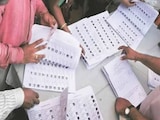The accident involving Kanchanjunga Express and a goods train in West Bengal's Darjeeling district last month occurred due to wrong interpretation of signals by the goods train driver, according to a preliminary report accessed by NDTV.
There were "lapses at multiple levels in managing the train operations under Automatic Signal Failures", which led to the collision, said the report submitted by the Commissioner of Railway Safety (CRS).
It gave a clean chit to the express train's loco pilot.
At least 10 people died and dozens others were injured as the Kanchanjunga Express was hit by a goods train near New Jalpaiguri on June 17. The express train was travelling from Agartala in Tripura to Sealdah in Kolkata.
The loco pilot of the goods train and two other railway staff were among the dead.
The report, which classified the accident in "Error in Train Working" category, pointed out that a wrong paper authority was issued to cross an area where automatic signalling system is not functional.
The second error, according to the report, was that the loco pilot was not alerted to maintain a particular speed-limit while crossing the area with no automatic signalling system.
The report also found that the loco pilot and the train manager were not provided with walkie talkies, which could have prevented the collision. It also pointed to "inadequate counselling" of the loco pilots and station masters about train operation in auto-signalling areas, which led to misinterpretation and misunderstanding of railway rules.
After the submission of the report, the Railways decided to increase reliability of signaling equipment and prepare an action plan for zonal managers. It is also working on Kavach, a made-in-India system to help prevent accidents when two trains are travelling on the same line.















